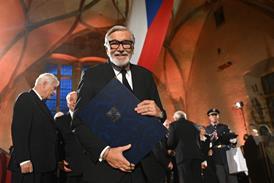South Korean filmmakers are protesting major multiplex chain Megabox’s sudden cancellation of screenings for controversial documentary Project Cheonan Ship.
A day after the film’s Sept 5 release, Megabox announced on its website that it was putting an end to screenings of Project Cheonan Ship because of certain organizations’ “strong objections and forewarnings of protest demonstrations” and to “guarantee the safety of general audiences”.
At a press conference in Seoul, producer Chung Ji-young, whose own directorial works include the much-talked-about National Security and Unbowed, was joined by Project Cheonan Ship director Baek Seung-woo and representatives of a slew of industry organizations including the Directors Guild of Korea (DGK), the Korean Association of Film Art and Industry, the Korean Film Producers Association (KFPA), the Cinematographers Guild of Korea and the Korean Film Marketers Association.
Dealing with the 2010 sinking of South Korean naval ship Cheonan and the issues surrounding the investigation that took place, Project Cheonan Ship raises the possibilities of alternative reasons for the sinking other than the government’s conclusion that the only explanation could be a North Korean torpedo. It also takes issue with the political pressures put on dissenting opinions in the country.
The film premiered this April at the Jeonju International Film Festival at which time the defense ministry criticized it for creating “confusion” in South Korean society.
Navy officers and Cheonan victims’ families recently tried to get the film banned in court but were overruled a day before the release.
KFPA head Lee Eun, who produced The President’s Last Bang - another political film that ran into trouble with conservative groups, said they would inquire into specifically whether this incident was caused by exigencies from conservative groups or political pressure.
He warned: “If we silently let go a case where you can go above the law to block a film’s screening, it’s a serious infringement of freedom of expression and the people’s right to know.”
Head of the DGK, Lee Joon-ik warned that such a precedent could cause filmmakers to self-censor their ideas and productions.
“Putting self-censorship pressure on filmmakers blocks the development of cultural content,” he said.
The Korean Film Council puts the film’s admissions at 5,716 as of Sept 9, comparable with The Bling Ring, which opened the same day and took in 3,493 admissions. The documentary is self-distributed by producer Aura Pictures. It started out on 33 screens and is now down to six.



































No comments yet